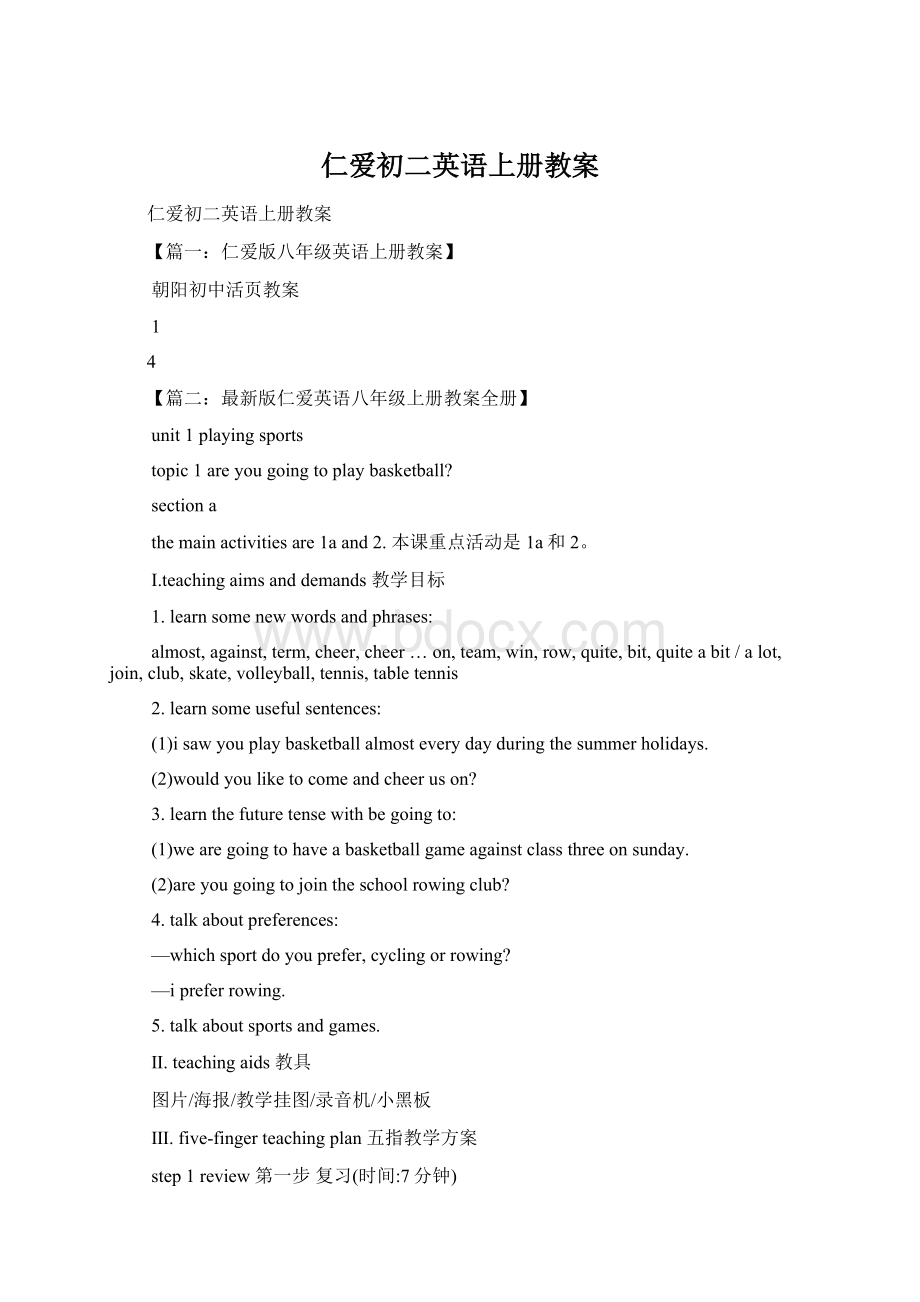仁爱初二英语上册教案.docx
《仁爱初二英语上册教案.docx》由会员分享,可在线阅读,更多相关《仁爱初二英语上册教案.docx(11页珍藏版)》请在冰豆网上搜索。

仁爱初二英语上册教案
仁爱初二英语上册教案
【篇一:
仁爱版八年级英语上册教案】
朝阳初中活页教案
1
4
【篇二:
最新版仁爱英语八年级上册教案全册】
unit1playingsports
topic1areyougoingtoplaybasketball?
sectiona
themainactivitiesare1aand2.本课重点活动是1a和2。
Ⅰ.teachingaimsanddemands教学目标
1.learnsomenewwordsandphrases:
almost,against,term,cheer,cheer…on,team,win,row,quite,bit,quiteabit/alot,join,club,skate,volleyball,tennis,tabletennis
2.learnsomeusefulsentences:
(1)isawyouplaybasketballalmosteverydayduringthesummerholidays.
(2)wouldyouliketocomeandcheeruson?
3.learnthefuturetensewithbegoingto:
(1)wearegoingtohaveabasketballgameagainstclassthreeonsunday.
(2)areyougoingtojointheschoolrowingclub?
4.talkaboutpreferences:
—whichsportdoyouprefer,cyclingorrowing?
—ipreferrowing.
5.talkaboutsportsandgames.
Ⅱ.teachingaids教具
图片/海报/教学挂图/录音机/小黑板
Ⅲ.five-fingerteachingplan五指教学方案
step1review第一步复习(时间:
7分钟)
复习学过的运动项目名称,引出生词。
1.(展示一些有关运动的图片,并通过师生对话,引出新的运动项目名称。
)
t:
youenjoyyourselvesduringyoursummerholidays?
whatdidyoudoduringyourholidays?
didyoudosportsduringyoursummerholidays?
ss:
…)
t:
weallknowdoingsportsisgoodforourhealth.nowlet’sreviewsomesportsandlearnsomenewones.(展示学生在打篮球的图片。
)
t:
lookatthepicture.doyouknowwhattheyaredoing?
s1
please.
s1:
theyareplayingbasketball.
t:
doyoulikeplayingbasketball?
s1:
yes,ido./no,idon’t.
t:
)s1:
therearefiveplayers.
(展示学生在打排球的图片。
)
t:
whataretheydoing?
s2,doyouknow?
s2教师帮助该生回答。
)
)
(用同样的方式引出生词cycle,row,skate,tennis,tabletennis,ski。
)
;掌握row,skate,tennis,tabletennis。
)
的用法。
)
t:
whichsportdoyoulikebetter,cyclingorrowing?
s3:
rowing.
t:
good!
thephrase“like…better”
means“”.
)
4s4:
ipreferbasketball.
…
step2presentation第二步呈现(时间:
10分钟)
通过师生对话,呈现1a中部分生词及功能句,并使学生初步掌握begoingto句型。
1.(利用plantodosth.,导入“begoingto+do”结构。
)
t:
i’mverygladyoualllikedoingsportsandknowalotaboutthem.doyouwanttoplayvolleyballtomorrowafternoon?
s1,please.
s1:
yes,ido.
t:
soyouplantoplayvolleyballtomorrowafternoon,right?
s1
:
yes.
t:
)
t:
whenitellyoumyplan,youretellitwithbegoingto.ok,boysandgirls?
ss:
ok.
t:
iplantogooutfordinnertonight.s2,please.
s2:
youaregoingtogooutfordinnertonight.
t:
iplantoclimbmountainstomorrow.s3,please.
s3:
youaregoingtoclimbmountainstomorrow.
t:
good!
whenweexpresssomethingthatisgoingtohappenorweplantodosomething,wecanusegoingto.
2.(教师让几个学生说说明天户外活动的打算,并引出begoingto结构的一般疑问句式,过渡到1a。
)
t:
ok,s4,pleasetellmewhatyouplantodotomorrowafternoon.
s4:
i’mgoingtoswimwithmybrothertomorrowafternoon.
s4:
(板书,学习新句型。
)be
(教师视学生掌握的情况来决定是否要进行更多的操练。
)3.(展示一幅即将进行篮球赛的海报,引出单词against,cheer和短语cheer…on。
)
t:
nowlookattheposter.hereisthenews.ourclassisgoingtohavea
ss:
yes,we’dloveto./i’
dloveto.
)
(出示教学挂图,让学生看图片猜测对话内容,导入1a。
)
t:
lookatthispicture.theyarekangkangandmichael.whatarethey
canyouguess?
pleaselistento1aandthenanswerthefollowingquestions.
(听后核对答案。
)
4.(学生朗读1a,画出疑难点和关键词,然后教师解释疑难点。
)
step3consolidation第三步巩固(时间:
10分钟)
创设情景,编对话,在真实的语境中培养学生口头交流能力。
1.(根据小黑板上的关键词,分角色表演对话。
)
t:
ok.nowyoucanusethekeywordsabovetoactoutthedialoginroles.
2.(教师引导学生,通过讨论新学期的计划来操练begoingto+do句型。
)
(教师先做示范,然后让学生两人一组练习。
)
t:
s1,whatareyougoingtodothisterm?
s1:
i’mgoingtolearnenglishbetter.
t:
whataboutyou,s2?
s2:
i’mgoingtostudymathhard.
t:
oh,it’sagoodplan.s3,doyouknowwhatyourpartnerisgoingtodo?
s3
:
yes.heisgoingtolearnrowing.
t:
discusswithyourpartnerwhatyouaregoingtodothisterm.
3.(创设情景,依据1a编对话,巩固1a及begoingto+do句型,完成1b。
)
t:
justnowyoutalkedaboutyourplansforthisterm.nowsupposeyoumeet
yourclassmateontheplaygroundandyouwanttotalkaboutyourplansforthisweek.pleasemakeasimilarconversationwithyourpartneraccordingto1a.youcanusethekeywordsontheblackboard.
(学生两人一组编对话,教师进行鼓励启发,必要时应给予帮助。
)
example:
s4:
hi,s5.
s5:
hi,s4.iamgoingtoplay…areyougoingtoplaywithus?
s4:
i’mafraidican’t.ihavetodomyhomeworkfirst.bytheway,isawyouplay…almosteverydayduringthesummerholidays.talkingabout?
basketballgame
【篇三:
2016级仁爱英语八年级上教学案1】
2016级英语科八年级(上)教学案1guidedteanhingandlearningplan(grade8)
五段八步教学法:
问题展示→问题讨论→问题解决→知识感知→课堂反思
第一课时
上期知识复习
:
学会一般现在时的构成及其变化
第一步:
向学生展示复习或预习问题
概念:
经常、反复发生的动作或行为及现在的某种状况。
时间状语:
always,usually,often,sometimes,never,seldom,everyweek(day,year,month…),
onceaweek,onsundays,等等
基本结构:
1.主语+动词的原形。
(用do来表示否定和疑问关系)例如:
theygotoschoolbybuseveryday.句型转换如下:
1.否定句:
theydon?
tgotoschoolbybuseveryday.2.一般疑问句:
dotheygotoschoolbybuseveryday?
3.特殊疑问句:
1)whogotoschoolbybuseveryday?
(对主语提问用who)
2)whatdotheydobybuseveryday?
(对动作部分提问用what,再用do来代替)3)howdotheygotoschooleveryday?
(对方式提问用how)4)whendotheygotoschoolbybus?
(对时间提问用when)2.主语(当主语是第三人称单数时)+动词的第三人称单数时形式。
(即动词加s,es的形式)
4.规则:
1.直接加s.2.以s,x,sh,ch结尾的加es.3.以辅音字母加y结尾的,先变y为i再加es4.以f,fe结尾的,先变f,fe为v再加es.(用does来表示否定和疑问关系)例如:
句型转换如下:
1.否定句:
shedoesn?
tplaybasketballontheplaygroundonsundays.
2.一般疑问句:
doessheplaybasketballontheplaygroundonsundays3.特殊疑问句:
1)whoplaysbasketballontheplaygroundonsundays?
(对主语提问用who)2)whatdoesshedoontheplaygroundonsundays?
(对动作部分提问用what,再用do来代替)
3)wheredoessheplaybasketballonsundays?
(对地点提问用where)4)whendoessheplaybasketballontheplayground(对时间提问用when)
学习过程:
自主预习
第二步:
分小组讨论并解决学案中的问题和测试题
第三步:
教师抽查小组讨论情况,展示讨论结果
课堂合作学习与探究
1.小组讨论自主学习中遇到的问题
2.在组长的带领下解决自主学习中的问题,核对答案
第四步:
在教师的引导下进行本堂课重难知识的感知和突破第五步:
巩固本堂课知识对学生进行“说或写”训练第六步:
分小组自我消化、反思、总结本堂课的重点内容,教师进行巡查或抽查
拓展与提升
第七步:
教师展示练习题,对本堂重点知识进行当堂训练
.句型转换a.同义转换
1.theygotoschoolbysubway.they_____thesubway______________.2.lipinggoestothesupermarketonfoot.liping____________thesupermarket.3.igotoworkinacar.i____________togotowork.
4.howmanytimesamonthdoyouwatchtv?
__________doyouwatchtv?
5.isometimesplaycomputergames.______iplaycomputergames.6.iseldomgotothelibrary.idon?
tvery_____gotothelibrary.7.thankyouallthesame._______you______.
8.couldyoulendmethisbook?
could____________thisbook?
9.imustgivethebookbacktothelibraryontime.imust______thebookontime.10.howdoyoulikeourschoollife?
whatdoyou____________ourschoollife?
b.改否定句和一般疑问句
1.lipingusuallygoestoschoolbybus._____lipingusually______toschoolbybus?
.liping_______usually______toschoolbybus.
2.weifangseldomwatchestvonweekdays.______weifangseldom______tvonweekends?
weifang_____often_____tvonweekdays.
3.iamputtingamaponthewall._____you______amaponthewall?
i__________puttingamaponthewall.
4.theyaredoingtheirhomework._____they_____theirhomework?
they____________theirhonework.
ourclassroom______________tothecomputerroom.c.对画线部分提问
1.shealwaysdoesherhomeworkintheevening.___________sheaways_____intheevening?
2.ioftengohomebysubway.____________youoften______home?
3.missgaoisintheoffice._____________missgao?
4.sheoftengoestoworkonfoot.__________________shegotoworkonfoot?
5.theyarewatchingtvathone.____________they______tv?
____________they_______tv?
6.idon?
tlikeenglish,becauseitdiifferent.____________youlikeenglish?
第八步:
教师点评并总结,布置课后任务用所给单词的正确形式填空
1.itistime_____(go)toschool.2.youmust______(get)upearly,oryou?
llbelate.
3.todayisthe______(one)dayofthisyear.4.let?
s______(go)home.
5.iwant______(be)ateacher,whenigrowup.6.whatabout______(play)basketball.7.yournewwatch______(look)verynice.8.doyoufinish______(write)letters?
9.iwant_____(know)yourschoollifeatschool.10.workmustcome______(one).
11.sometimesigo______(dance)withmymom.12.wegotothezoo_______(one)amonth.13.ioftenread_____(story)books.14.fangminghelps_______(clean)thehouse.15.youmust_______(have)arestatnoon.15.what_____jennyusually_____(do)afterschool.16.______heusually_______(get)toschoolearly?
17.whattime______they______(eat)lunch?
18.iwanttolearn______(draw)pictures.19.mathsisn?
tvery______(interest).20.weshouldtry______(do)ourbesteachday.21.whynot______(go)withyourfriends.22.doyoulike______(have)englishclasses.
课后反思
________________________________________________________________________________________________________________________________________________________________________________________________________________________________________________________________________
第二课时
上期知识复习
:
学会现在进行时的构成及其变化
第一步:
向学生展示复习或预习问题
?
概念:
表示现阶段或说话时正在进行的动作及行为。
?
时间状语:
now,atthistime,thesedays,etc.提示词looklisten)
基本结构:
主语+be(is/am/are)+动词的现在分词形式(既动词加ing的形式)(1.
直接加ing.2.去e加ing.3.双写加ing)例句:
sheisdancingunderabigtreenow.句型转换如下:
1.否定句:
sheisn?
tdancingunderabigtreenow.2.一般疑问句:
isshedancingunderabigtreenow.
3.特殊疑问句:
1)whoisdancingunderabigtreenow?
2)whatisshedoingunderabigtree
now?
3)whereisshedancingnow?
4)whenisshedancingunderabigtree?
学习过程:
自主预习
第二步:
分小组讨论并解决学案中的问题和测试题第三步:
教师抽查小组讨论情况,展示讨论结果
课堂合作学习与探究
1.小组讨论自主学习中遇到的问题
2.在组长的带领下解决自主学习中的问题,核对答案
第四步:
在教师的引导下进行本堂课重难知识的感知和突破第五步:
巩固本堂课知识对学生进行“说或写”训练第六步:
分小组自我消化、反思、总结本堂课的重点内容,教师进行巡查或抽